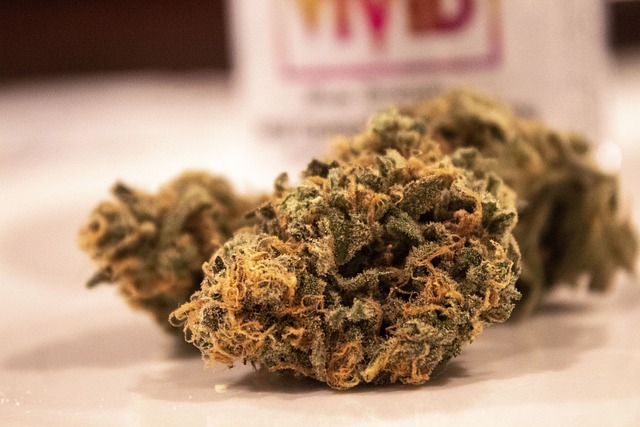THCA (Tetrahydrocannabinolic Acid), a non-psychoactive cannabinoid found in raw cannabis plants, has gained legal recognition in Massachusetts for its potential health benefits. Unlike THC (Tetrahydrocannabinol), THCA does not cause a 'high' and is classified as a molecule rather than a controlled substance in the state. The unique legal status of THCA allows consumers to access its anti-inflammatory, neuroprotective, and pain-relieving properties without psychoactive effects, which preliminary studies suggest it may offer. In Massachusetts, THCA flower is regulated by the Cannabis Control Commission (MCCC), with stringent requirements for cultivation, processing, and sale to ensure consumer safety and compliance with state laws. Consumers must adhere to age restrictions, purchase limits, and can only obtain THCA flower from licensed retail dispensaries. It's important for users to understand the legal context of THCA in Massachusetts, recognize potential side effects, and consider individual differences in response to ensure safe and informed use. Always consult with healthcare professionals when incorporating new wellness substances into your routine, especially if you have existing health issues or are taking other medications. THCA's legality in Massachusetts marks a significant step forward for the responsible exploration of its therapeutic potential.
Exploring the nuanced landscape of cannabinoids, this article delves into the emergence of THCA flower as a significant player within Massachusetts’ evolving legal framework. Known for its potential therapeutic properties and non-psychoactive nature, THCA has garnered attention for its medicinal benefits. As we traverse through the science behind THCA and its effects, users must be well-informed about its side effects, which are crucial to understand for safe consumption. We’ll explore these aspects, including dosage considerations and best practices for handling THCA flower responsibly, ensuring a comprehensive guide to this cannabinoid’s legal status and usage in Massachusetts.
- THCA Flower: Understanding the Cannabinoid at the Forefront of Massachusetts Legality
- The Science Behind THCA: Potential Benefits and Effects
- Legal Landscape: THCA Flower in Massachusetts – Compliance and Consumption
- Exploring the Side Effects of THCA Flower: What Users Should Know
- Dosage and Tolerance: Factors Influencing THCA Flower's Impact on Users
- Navigating Safety: Best Practices for Handling and Using THCA Flower Responsibly in Massachusetts
THCA Flower: Understanding the Cannabinoid at the Forefront of Massachusetts Legality
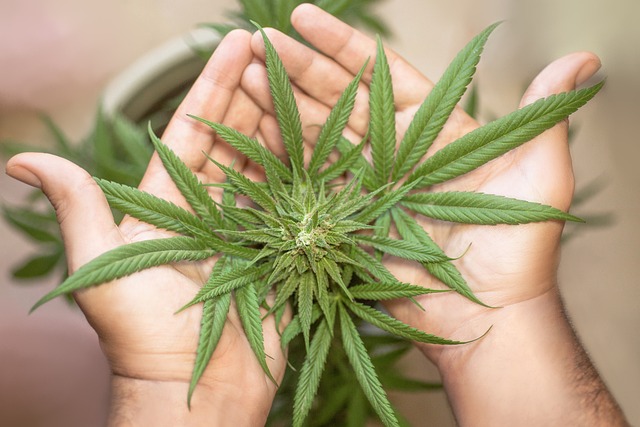
THCA, or Tetrahydrocannabinolic Acid, is a cannabinoid found naturally in raw cannabis plants and is at the forefront of legal discussions in Massachusetts. Unlike its more famous counterpart THC (Tetrahydrocannabinol), THCA is non-psychoactive, meaning it does not induce the ‘high’ commonly associated with cannabis consumption. The unique status of THCA in Massachusetts stems from recent legislative changes that have decriminalized and legalized certain forms of cannabis for various uses. Specifically, under Massachusetts law, THCA flower is legally distinct from other cannabinoids because it is categorized as a molecule rather than a controlled substance. This legal nuance allows consumers to purchase and possess THCA-rich flowers with lower psychoactive effects, providing them with the potential health benefits of cannabis without the intoxicating properties.
The therapeutic properties of THCA have been the subject of growing interest among both researchers and consumers in Massachusetts. Preliminary studies suggest that THCA may offer a range of benefits, including anti-inflammatory, neuroprotective, and potential analgesic effects. As such, the legal distinction between THCA and other cannabinoids has opened up new avenues for exploring the therapeutic potential of cannabis without the psychoactive consequences that traditionally accompany its use. This has significant implications for individuals seeking alternative treatments for various conditions while adhering to legal frameworks established by Massachusetts legislation. Understanding the legal intricacies surrounding THCA, especially its legality in Massachusetts, is crucial for both consumers and healthcare providers as they navigate this evolving landscape of cannabinoid wellness options.
The Science Behind THCA: Potential Benefits and Effects
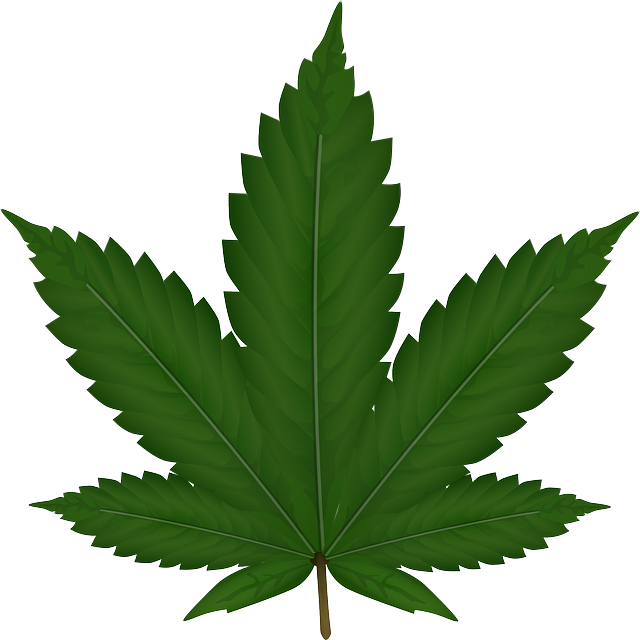
Delta-9 tetrahydrocannabinolic acid (THCA) is a naturally occurring compound found in the Cannabis sativa plant, which has garnered attention for its potential therapeutic properties. THCA is the raw form of THC, the psychoactive component of cannabis that becomes active when heated, as in smoking or vaporizing. In its natural state, however, THCA is non-psychoactive and is believed to possess a range of wellness benefits without the intoxicating effects associated with THC. Preliminary research suggests that THCA may have anti-inflammatory, neuroprotective, and analgesic properties, making it a subject of interest in various medical applications. As of the knowledge cutoff in 2023, THCA is legal in Massachusetts under state law for both medicinal and adult-use, provided it contains less than 0.3% delta-9 THC by dry weight.
Investigations into THCA’s effects have been conducted both in vitro and in vivo, with studies indicating that it could potentially alleviate symptoms of various conditions. For instance, animal models have shown that THCA may offer beneficial effects for pain management without the psychoactive consequences, making it a promising alternative for patients sensitive to or seeking to avoid THC’s high. Additionally, its anti-inflammatory properties are being explored for their potential in treating inflammatory diseases. In Massachusetts, where THCA is legal, consumers have access to products rich in this compound, allowing them to experiment with its potential health benefits while complying with state regulations regarding cannabis consumption and possession. As research continues to evolve, the understanding of THCA’s full spectrum of effects and its place within the therapeutic realm is expected to become clearer.
Legal Landscape: THCA Flower in Massachusetts – Compliance and Consumption

In Massachusetts, the legal landscape concerning the use and consumption of THCA flower has evolved with the state’s regulatory framework. The Massachusetts Cannabis Control Commission (MCCC) oversees the cultivation, processing, and sale of all cannabis products, including those containing THCA. THCA, or Tetrahydrocannabinolic Acid, is a non-psychoactive precursor to THC found in raw cannabis plants. As such, it falls under the state’s cannabis regulations, provided it adheres to the established compliance measures. These include licensing requirements for businesses dealing with THCA flower, stringent testing for contaminants, and labeling standards that inform consumers about the product’s origin, potency, and effects.
Consumers in Massachusetts have shown a growing interest in THCA flower due to its potential health benefits and the absence of psychoactive effects typically associated with THC. The consumption of THCA flower is regulated similarly to other cannabis products, with age restrictions and purchase limits in place to ensure responsible use. Retail dispensaries are the only legal outlets for acquiring THCA flower, emphasizing the importance of a regulated market that prioritizes consumer safety and legal compliance. As the market continues to mature, ongoing monitoring and adherence to state laws are crucial for maintaining the integrity of cannabis commerce in Massachusetts.
Exploring the Side Effects of THCA Flower: What Users Should Know
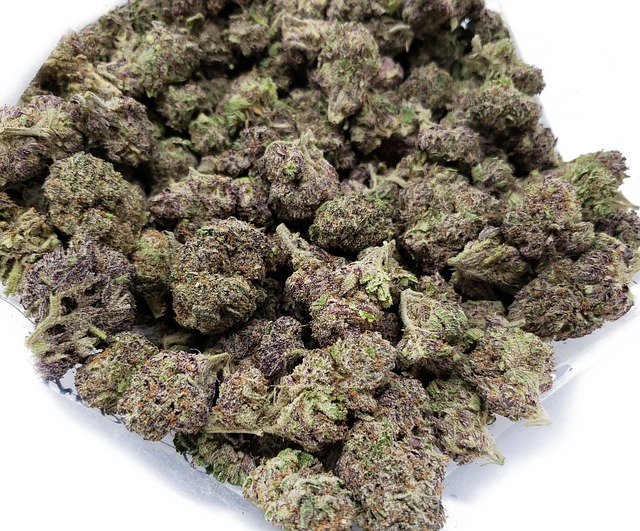
THCA, or tetrahydrocannabinolic acid, is a non-psychoactive cannabinoid found in raw cannabis plants and is precursor to THC, the psychoactive compound most are familiar with. As interest in cannabis derivatives grows, so does the use of THCA flower, which is often marketed for its potential wellness benefits. While THCA is generally considered safe, users should be aware of its side effects. In Massachusetts, where THCA is legal, consumers are navigating a new landscape of products and should approach them with informed caution. Reports suggest that common side effects may include dizziness, lethargy, dry mouth, and increased anxiety, particularly at higher doses. These effects can be more pronounced for individuals new to cannabis use or those sensitive to its compounds. It is also worth noting that THCA’s effects can differ from those of THC due to its non-psychoactive nature, making it a subject of ongoing research and interest in the cannabinoid community. Users considering THCA flower should educate themselves on proper dosing, potential interactions with other medications, and consult with healthcare professionals if they have concerns about how THCA may affect their health. As with any substance, understanding the science behind THCA and its legal status within Massachusetts is crucial for a safe and informed experience.
Dosage and Tolerance: Factors Influencing THCA Flower's Impact on Users
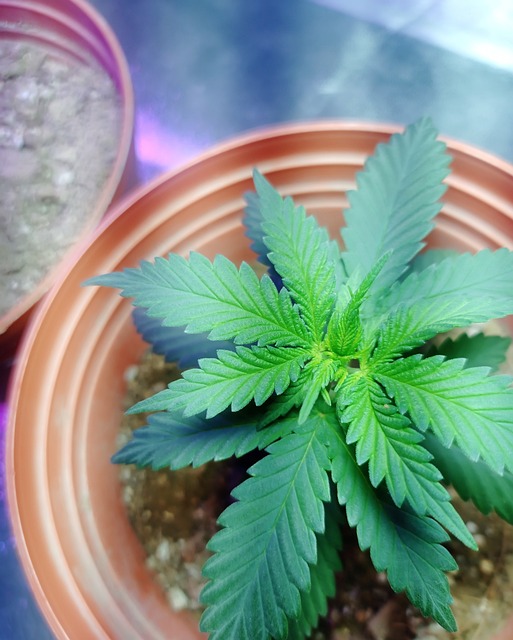
Delta-9-tetrahydrocannabinolic acid (THCA) is a non-psychoactive cannabinoid found in the Cannabis sativa plant, which precursors to the more well-known psychoactive compound delta-9-tetrahydrocannabinol (THC) when heated. As interest in the potential therapeutic benefits of THCA continues to grow, understanding its dosage and how individual factors influence its impact is crucial for users, especially given that THCA is legal in Massachusetts under state law.
The dosage of THCA flower can significantly affect its effects, as each user’s endocannabinoid system is unique. Factors such as body weight, cannabis tolerance, and the user’s individual metabolism play a role in how THCA is processed and its efficacy. It’s important for users to start with a low dose to gauge their reaction before gradually increasing it, as overconsumption can lead to adverse effects. Massachusetts residents who opt to use THCA must be aware that while the compound itself is non-psychoactive, dosage can still influence its impact, potentially leading to sedative or energizing effects depending on the amount consumed. Users should also consider the specific strain of THCA flower and its terpene profile, as these can modify the cannabinoid’s effects. With the legal status of THCA in Massachusetts, users have access to a range of products, but it is always recommended to consume responsibly and within the legal limits provided by state regulations.
Navigating Safety: Best Practices for Handling and Using THCA Flower Responsibly in Massachusetts
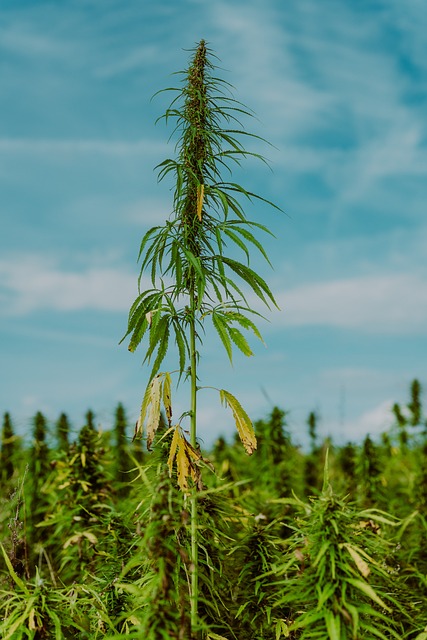
When incorporating THCA flower into one’s routine in Massachusetts, where it is legally permissible, adherence to safety practices is paramount. Users should always confirm the legality of THCA products within their specific locale, as regulations can vary by state and locality. Proper handling involves storing the THCA flower in a cool, dry place away from children and pets, to prevent accidental ingestion and ensure the potency and quality of the product remain intact. It’s crucial to follow dosing recommendations carefully, as overconsumption can lead to unwanted side effects. Additionally, users should be aware of their own body’s response to THCA, as individual sensitivities can differ significantly.
Ingestion methods also play a role in safety and efficacy. Whether using the flower for vaporization or infusion into edibles, precise temperature controls are essential to avoid combustion that could produce harmful byproducts. For those partaking in THCA flower as part of their wellness regimen, it’s important to start with a low dose and allow time for the effects to be fully assessed before increasing intake. Consulting with a healthcare provider is always recommended, especially for individuals with pre-existing health conditions or those taking other medications. By following these responsible use guidelines, Massachusetts residents can safely enjoy the potential benefits of THCA flower within the legal framework established by state laws.
users should be aware of potential side effects associated with THCA flower consumption. As detailed in “Exploring the Side Effects of THCA Flower: What Users Should Know,” common reactions may include dry mouth and red eyes, with some individuals experiencing more pronounced effects such as anxiety or paranoia, particularly at higher doses. It’s crucial for consumers to understand their tolerance levels and adhere to recommended guidelines, ensuring safe use within the framework established by Massachusetts’ THCA legal regulations, as outlined in “Navigating Safety: Best Practices for Handling and Using THCA Flower Responsibly in Massachusetts.” By staying informed about dosage and individual responses, users can enjoy the benefits of THCA flower while minimizing any adverse effects. As THCA continues to gain recognition for its potential therapeutic properties under legal scrutiny in Massachusetts, responsible consumption remains key to positive experiences with this cannabinoid.
